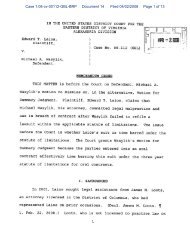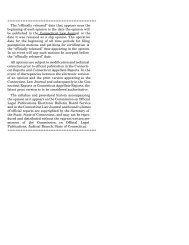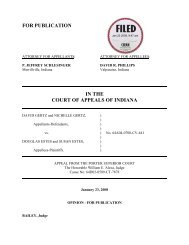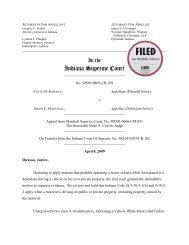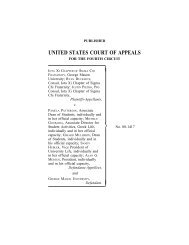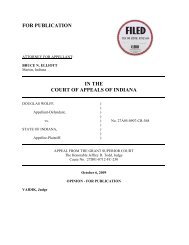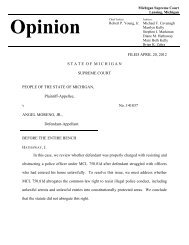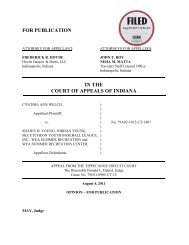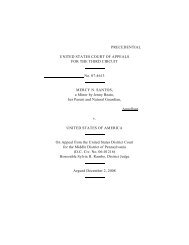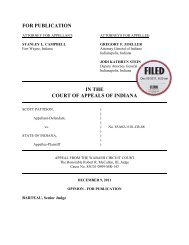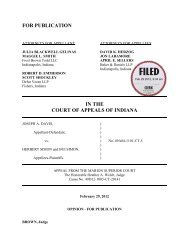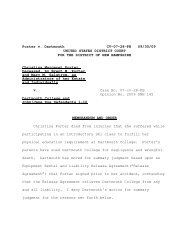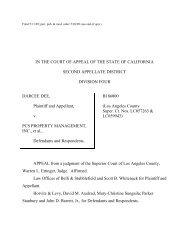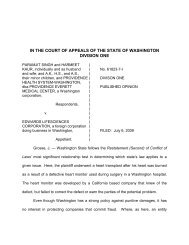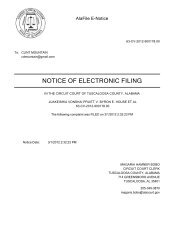JURY VERDICTS - Lawyers USA Online
JURY VERDICTS - Lawyers USA Online
JURY VERDICTS - Lawyers USA Online
You also want an ePaper? Increase the reach of your titles
YUMPU automatically turns print PDFs into web optimized ePapers that Google loves.
©iStockphoto.com/pagadesign<br />
<strong>Lawyers</strong><strong>USA</strong><br />
<strong>JURY</strong> <strong>VERDICTS</strong><br />
of 2010<br />
Top Ten continues to rise<br />
The size of the Top Ten Jury Verdicts increased again in 2010.<br />
The average increased less than the prior year, however, rising<br />
from nearly $145 million to just under $157 million. (The<br />
average for 2009 increased nearly $33 million from the prior<br />
year.)<br />
The top award was significantly higher in 2010 – $505.1 million<br />
versus $370 million. But then there was a sharp drop: the #2 award<br />
was $208.8 million, and the #3 award was $152 million. In contrast,<br />
2009 saw three awards in the $300 million range.<br />
The year’s top verdict went to a Las Vegas principal who developed<br />
Hepatitis C several weeks after undergoing a routine<br />
colonoscopy. During the procedure, he was given anesthesia<br />
from a 50 ml vial that had been reused from another patient.<br />
The #2 award went to a California woman who developed<br />
mesothelioma from exposure to her husband’s asbestos-laced laundry,<br />
and three of the Top Ten were against tobacco companies.<br />
<strong>Lawyers</strong> <strong>USA</strong> compiles the Top Ten Jury Verdicts each year,<br />
applying certain ground rules. First, verdicts must be to an individual<br />
plaintiff, defined as a single person, family or small group<br />
of individuals injured in a single incident who had their claims<br />
tried in one case before the same jury.<br />
Second, we do not include business-against-business suits, class<br />
actions or consolidated cases. Finally, cases must have been defended<br />
– default verdicts and suits against incarcerated individuals<br />
are not included.<br />
– Susan A. Bocamazo<br />
Top Ten Jury Verdicts of 2010 is produced by <strong>Lawyers</strong> <strong>USA</strong>, the national publication for small firm lawyers. Material published in Top Ten Jury Verdicts of 2010 may<br />
not be republished, resold, recorded or used in any manner, in whole or in part, without prior written consent. Any infringement will be subject to legal redress.
<strong>Lawyers</strong><strong>USA</strong><br />
Susan A. Bocamazo, Esq.<br />
– Publisher & Editor –<br />
susan.bocamazo@lawyersusaonline.com<br />
Henriette Campagne<br />
– Vice President of Editorial –<br />
henriette.campagne@lawyersweekly.com<br />
Reni Gertner<br />
– News Editor –<br />
reni.gertner@lawyersusaonline.com<br />
Correy E. Stephenson, Esq.<br />
– Associate Editor, New York Office –<br />
correy.stephenson@lawyersusaonline.com<br />
Kimberly Atkins, Esq.<br />
– Staff Writer, D.C. Office –<br />
kimberly.atkins@lawyersusaonline.com<br />
Sylvia Hsieh, Esq<br />
– Staff Writer, California Office –<br />
sylvia.hsieh@lawyersusaonline.com<br />
Tony Ogden<br />
– Website/Editorial Assistant –<br />
anthony.ogden@lawyersusaonline.com<br />
Patrick M. Murphy, Esq.<br />
– Legal Editor –<br />
patrick.murphy@lawyersusaonline.com<br />
John L. Mecklenburg<br />
– Art Director –<br />
john.mecklenburg@lawyersweekly.com<br />
JoAnn Griffin<br />
– Circulation Marketing Manager –<br />
joann.griffin@lawyersweekly.com<br />
Charlene J. Smith<br />
– Vice President of Sales –<br />
charlene.smith@lawyerweekly.com<br />
Liz Thomson<br />
– Advertising Account Executive–<br />
liz.thomson@lawyersweekly.com<br />
Thomas F. Harrison<br />
– Vice President, New Business Development –<br />
Malee S. Nuesse<br />
– Vice President, Circulation –<br />
Scott Murdoch<br />
– Circulation Manager –<br />
______________________________<br />
You can contact <strong>Lawyers</strong> <strong>USA</strong><br />
via the Internet at:<br />
comments@lawyersusaonline.com<br />
Or call <strong>Lawyers</strong> <strong>USA</strong> at 800-444-5297<br />
The Dolan Company<br />
James P. Dolan<br />
– Chairman, President/CEO –<br />
Scott J. Pollei<br />
– Executive Vice President/CFO –<br />
Mark W.C. Stodder<br />
– Executive Vice President/Newspapers –<br />
Christopher A. Eddings<br />
– Director of Publishing Operations –<br />
Glenda Russell<br />
– Group Publisher –<br />
glenda.russell@thedolancompany.com<br />
______________________________<br />
LAWYERS <strong>USA</strong> (ISSN-1931-9584.) is published monthly by<br />
<strong>Lawyers</strong> Weekly Inc., 10 Milk St., 10th Floor, Boston, MA<br />
02108. Price is $26 per copy plus shipping and handling,<br />
$220 per year, $129 for 6 months. POSTMASTER: Send<br />
address changes to LAWYERS <strong>USA</strong>, 10 Milk St., 10th Floor,<br />
BOSTON, MA 02108. Periodicals postage paid at Boston, MA<br />
and additional mailing offices. Copyright 2011 <strong>Lawyers</strong><br />
Weekly Inc. Material published in <strong>Lawyers</strong> <strong>USA</strong> is compiled<br />
at substantial expense and is for the sole and exclusive use<br />
of purchasers and subscribers. The material may not be<br />
republished, resold, recorded, or used in any manner, in<br />
whole or in part, without the publisher’s explicit consent.<br />
Any infringement will be subject to legal redress.<br />
tableofcontents<br />
Small firm wins $505.1 million verdict ...........................................................3<br />
Worker’s wife awarded $208.8 million for cancer<br />
due to asbestos-laced laundry ...................................................................4<br />
$152M for woman given free cigarettes as a child...........................................5<br />
Small firm lawyers win $132.5M in Ford rollover retrial...................................6<br />
Jury awards $124.5M in passenger van crash .................................................7<br />
Law firm slammed with $103 million verdict<br />
for working against client .........................................................................8<br />
Fla. jury awards $90.8M to smoker’s widow....................................................9<br />
$89 million awarded in airplane crash case...................................................10<br />
Jury delivers $82.5M gas explosion verdict ...................................................11<br />
Tobacco plaintiff wins $80 million verdict .....................................................12<br />
<strong>Lawyers</strong><strong>USA</strong><br />
lawyersusaonline.com<br />
2
$505.1 MILLION<br />
By Sylvia Hsieh<br />
Staff writer<br />
Arguing that oversized vials<br />
of a drug were “weapons<br />
of mass infection” that<br />
led to an outbreak of<br />
Hepatitis C at outpatient surgical<br />
centers, Las Vegas plaintiffs’ attorney<br />
Robert Eglet convinced a jury<br />
that the manufacturer and its distributor<br />
should be punished with<br />
$500 million in punitive damages.<br />
The verdict was the opening<br />
salvo for over 100 pending cases<br />
against Teva Pharmaceuticals,<br />
the manufacturer of the anesthesia<br />
propofol, and distributor Baxter<br />
Healthcare.<br />
“This verdict sets the tone and<br />
hopefully sends the message that<br />
[the defendants] ought to think<br />
about sitting down and settling<br />
“I gave the<br />
jury a range<br />
of $250<br />
million to $1<br />
billion. They<br />
came back<br />
right in the middle.”<br />
– Robert Eglet<br />
these cases,” said Eglet, a partner<br />
at the 12-lawyer firm Mainor Eglet<br />
Cottle in Las Vegas.<br />
The plaintiff’s case hinged on<br />
the theory that the defendants<br />
knew that the large vials created<br />
a risk that doctors would reuse<br />
them in shorter surgeries requiring<br />
smaller doses, thus spreading<br />
infections between patients.<br />
The source of the lawsuit was<br />
an outbreak of Hepatitis C at several<br />
colonoscopy clinics in Las Vegas.<br />
Two subsequent outbreaks<br />
in Miami and Washington D.C.<br />
also occurred, according to Eglet.<br />
Teva Pharmaceuticals could<br />
not be reached for comment, and<br />
defense attorneys Mark Tully and<br />
TOP (1) TEN<br />
<strong>JURY</strong> <strong>VERDICTS</strong> OF 2010<br />
Small firm wins $505.1 million verdict<br />
U. Gwyn Williams of Goodwin<br />
Procter in Boston did not return<br />
calls seeking comment.<br />
Kellie Hotz, a spokesperson<br />
for Baxter Healthcare, said that<br />
the company will argue on appeal<br />
that the jury should have<br />
heard about unsafe practices<br />
among medical professionals<br />
who reuse syringes and vials.<br />
Eglet also sued the doctors and<br />
nurses who administered the doses,<br />
but they settled for a confidential<br />
amount before trial.<br />
Routine colonoscopy<br />
Plaintiff Henry Chanin, 62, the<br />
principal of The Meadows prep<br />
school in Las Vegas, underwent a<br />
routine colonoscopy in 2006 during<br />
which he was given propofol<br />
from a 50 ml vial that had been<br />
reused from another patient. Several<br />
weeks later he developed<br />
acute symptoms of Hepatitis C.<br />
Although the defendants disputed<br />
causation, Eglet said it was<br />
“pretty clear” that Chanin contracted<br />
the illness at the clinic because<br />
his bloodwork showed he<br />
did not have the disease two days<br />
before surgery and he developed<br />
symptoms within the gestation<br />
period.<br />
The state department of health<br />
later sent out letters warning<br />
50,000 patients of colonoscopy<br />
and endoscopy centers about the<br />
outbreak and advising them to get<br />
tested for various blood-borne<br />
illnesses.<br />
Because of the intense publicity,<br />
lawyers devoted a full week to<br />
jury selection; many in the jury<br />
pool were patients who had received<br />
warning letters.<br />
During the three weeks of trial,<br />
Eglet argued that the defendants<br />
didn’t warn health care providers<br />
and its own sales representatives<br />
that 50 ml vials of propofol are<br />
“way too big for a 12-15 minute<br />
colonoscopy.”<br />
“Health care providers are not<br />
going to take a 50 ml vial, use 10<br />
From left, attorney Robert Eglet and plaintiffs Henry Chanin and Lorraine Chanin.<br />
ml and throw the rest away.<br />
They’re going to use it on the next<br />
patient. [The defendants] know<br />
that; it’s been going on forever,”<br />
said Eglet.<br />
A persuasive piece of evidence<br />
pointing to what the company<br />
knew and when it knew it was a<br />
document from 2000 in which<br />
Teva requested and got FDA approval<br />
for producing smaller 10<br />
ml and 20 ml vials. The company<br />
stated that the smaller-dose vials<br />
were closer to the amount needed<br />
for shorter procedures and<br />
would reduce the risk of reusing<br />
the vials and spreading infection,<br />
Eglet said.<br />
Verdict: $5.1 million in<br />
compensatory damages and<br />
$500 million in punitive damages<br />
State: Nevada<br />
<strong>Lawyers</strong><strong>USA</strong><br />
lawyersusaonline.com<br />
Type of case: Product liability<br />
Status: On appeal<br />
Case name: Chanin v. Teva<br />
Pharmaceuticals<br />
AT-A-GLANCE<br />
The document forced its author,<br />
a pharmacist with Teva, to<br />
admit on the stand that the risk of<br />
infection was foreseeable.<br />
Eglet also argued that the company<br />
had constructive knowledge<br />
of 148 reported cases of infections<br />
associated with propofol at endoscopy<br />
centers and that under<br />
the “Kessler rule” of statistics,<br />
every reported case represents<br />
100 unreported cases.<br />
The parties battled back and<br />
forth over the sufficiency of a<br />
warning label that said the drug<br />
was for a “single use.”<br />
Although Eglet argued that the<br />
Continued on page 14<br />
Date: April 5, 2010<br />
Plaintiff’s attorney: Robert Eglet of<br />
Mainor Eglet Cottle in Las Vegas.<br />
Defense attorneys: Mark Tully and<br />
U. Gwyn Williams of Goodwin<br />
Procter in Boston.<br />
3
$208.8 MILLION<br />
By Sylvia Hsieh<br />
Staff writer<br />
Like many women of her generation,<br />
68-year-old Rhoda<br />
Evans took care of the<br />
home, did the cooking<br />
and cleaning, and tended to the<br />
family laundry, including washing<br />
her husband’s work clothes during<br />
his twenty years at a pipe-cutting<br />
job.<br />
Years later, she learned those<br />
clothes – the ones she insisted he<br />
remove and shake out every night<br />
upon entering their home – contained<br />
microscopic asbestos<br />
fibers that will kill her.<br />
In April, Evans won a jury verdict<br />
for the mesothelioma caused<br />
“We got a lot of ammunition<br />
from other law firms<br />
sending us stuff.”<br />
– William A. Levin<br />
by asbestos contamination that<br />
her husband Bobby brought home<br />
from his job.<br />
William Levin, the winning attorney,<br />
said the most inflammatory<br />
piece of evidence was a file kept<br />
TOP (2) TEN<br />
<strong>JURY</strong> <strong>VERDICTS</strong> OF 2010<br />
Worker’s wife awarded $208.8 million<br />
for cancer due to asbestos-laced laundry<br />
Verdict: $8.8 million in<br />
compensatory damages and<br />
$200 million in punitive damages<br />
State: California<br />
Type of case: Product liability<br />
Status: On appeal.<br />
Case name: Evans v. AW Chesterton<br />
AT-A-GLANCE<br />
by the director of safety that<br />
showed CertainTeed had known<br />
since the mid-1960s, before Bobby<br />
Evans worked with their pipes,<br />
that they contained asbestos, that<br />
asbestos caused mesothelioma<br />
even in small amounts and that<br />
wives had developed cancer from<br />
exposure to “take-home asbestos”<br />
on their husbands’ clothes.<br />
But Levin said he did not take<br />
liability for granted, spending<br />
much of the month-long trial<br />
pounding away at causation,<br />
which CertainTeed disputed. He<br />
contacted plaintiffs’ attorneys in<br />
similar cases and obtained a report<br />
from a previous trial that he<br />
used to impeach a defense expert<br />
who argued that the cause of<br />
Evans’ illness was unknown.<br />
“We got a lot of ammunition<br />
from other law firms sending us<br />
stuff,” said Levin, a partner at<br />
Levin Simes Kaiser & Gornick in<br />
San Francisco.<br />
In the punitive damages phase,<br />
the judge did not allow Levin to<br />
ask the jury for a specific amount;<br />
ironically, he had planned to tell<br />
the jury not to exceed nine times<br />
the compensatory award.<br />
William Sayers, who represented<br />
CertainTeed, did not return<br />
a call seeking comment. He<br />
Date: April 29, 2010<br />
Plaintiff’s attorneys: William A.<br />
Levin and Laurel L. Simes of Levin,<br />
Simes Kaiser & Gornick in<br />
San Francisco.<br />
Defense attorneys: William J.<br />
Sayers and Mark Geraghty of<br />
McKenna Long & Aldridge in<br />
Los Angeles.<br />
<strong>Lawyers</strong><strong>USA</strong><br />
lawyersusaonline.com<br />
Plaintiff Rhoda Evans testifies at the trial where she won $208.8 million after contracting<br />
mesothelioma from asbestos dust her husband brought home from work on his clothes.<br />
referred questions to corporate<br />
spokesperson Karen Cawkwell,<br />
who e-mailed a statement calling<br />
the verdict “excessive” and maintaining<br />
that because the company<br />
“acted in good faith and did<br />
not conceal information regarding<br />
the safety of its products …<br />
there is no basis for any award of<br />
punitive damages.”<br />
Crocidolite fibers<br />
Bobby Evans worked for the<br />
Los Angeles water department<br />
from 1974 until 1992, cutting water<br />
pipe made of asbestos and cement<br />
with a power saw.<br />
A power saw generates 300 million<br />
asbestos fibers per cubic meter<br />
of air, which exceeds OSHA limits<br />
by three to 10 times, Levin said.<br />
At trial, he explained that<br />
mesothelioma is a signature disease<br />
caused by asbestos, in this<br />
case by a fiber known as crocidolite,<br />
the deadliest of the four<br />
types of asbestos fiber.<br />
Even though the phenomenon<br />
of asbestos spreading through a<br />
household on clothing is well-accepted,<br />
CertainTeed disputed liability<br />
by putting on a number of experts<br />
who claimed a certain percentage<br />
of mesothelioma occurs<br />
Plaintiff’s attorneys William A. Levin<br />
and Laurel L. Simes.<br />
without any known occupational<br />
exposure to asbestos – approximately<br />
one per million in the regular<br />
non-exposed population.<br />
“They were arguing she was<br />
one in a million,” Levin said.<br />
It didn’t help CertainTeed that<br />
its co-defendant, the city, sat at the<br />
same table conceding causation.<br />
CertainTeed’s second defense<br />
was to blame the water department<br />
for not warning its workers<br />
about asbestos.<br />
But Levin asked the jury how a<br />
corporation that never told its<br />
customers about risks could turn<br />
around and blame its customer in<br />
Continued on page 13<br />
4
$152 MILLION<br />
By Correy E. Stephenson<br />
Staff writer<br />
In a landmark victory, a Massachusetts<br />
jury has awarded<br />
$152 million<br />
to the son<br />
of a deceased<br />
woman who received<br />
free cigarettes<br />
as a child<br />
from representatives<br />
of tobacco<br />
company Lorillard.<br />
The verdict,<br />
which includes<br />
$81 million in<br />
punitive damages, was the largest<br />
verdict in the state in 2010, and<br />
the first ever victory for an individual<br />
plaintiff over Lorillard, the<br />
third-largest cigarette manufacturer<br />
in the United States.<br />
“The facts of this case are<br />
shocking,” asserted plaintiff’s attorney<br />
Michael D. Weisman. Weisman<br />
represented Willie Evans, the<br />
son of Marie Evans, who died of<br />
lung cancer in 2002.<br />
“Mrs. Evans received cigarettes<br />
as give-aways in and around the Orchard<br />
Park playground when she<br />
was just a child,” he said. Although<br />
Mrs. Evans initially traded the cig-<br />
TOP (3) TEN<br />
<strong>JURY</strong> <strong>VERDICTS</strong> OF 2010<br />
$152M for woman given free cigarettes<br />
as a child<br />
arettes to her big sisters for candy,<br />
she began smoking them at about<br />
age 13 and continued to smoke for<br />
the next 40 years of her life.<br />
Mark Gottlieb, director of the<br />
Tobacco Products Liability Project<br />
at Northeastern University<br />
School of Law, said this verdict<br />
is currently the largest in an individual<br />
smoking and health<br />
case, because larger verdicts in<br />
California and Florida were later<br />
reduced.<br />
The jury’s message to Lorillard<br />
Verdict: $71 million in compensatory<br />
damages and $81 million in<br />
punitive damages<br />
State: Massachusetts<br />
Type of case: Wrongful death<br />
Status: No change.<br />
Case name: Evans v. Lorillard<br />
Date: Dec. 14, 2010 (compensatory<br />
award) and Dec. 16, 2010<br />
(punitive award).<br />
AT-A-GLANCE<br />
was clear, he said: “What was<br />
done to Ms. Evans was totally unacceptable.”<br />
Gottlieb suggested that that<br />
more cases involving children<br />
and free samples will almost certainly<br />
be filed as a result.<br />
In a statement, the company<br />
said it plans to appeal.<br />
“Lorillard respectfully disagrees<br />
with the jury’s verdict and<br />
denies the plaintiff’s claim that<br />
the company sampled to children<br />
or adults at Orchard Park in the<br />
Plaintiff’s attorneys: Michael D.<br />
Weisman, Thomas Frisardi, Joshua<br />
S. Grossman and Kendra Kinscherf<br />
of Davis, Malm & D’Agostine in<br />
Boston.<br />
Defense attorneys: Walter L. Cofer<br />
and Gay L. Tedder of Shook Hardy<br />
Bacon in Kansas City, Mo.; Andrew<br />
J. McElaney, Jr. of Nutter<br />
McClennen & Fish in Boston;<br />
Walter B. Prince of Prince Lobel<br />
Glovsky & Tye in Boston.<br />
Marie Evans (pictured starting from left)<br />
began smoking at age 13 and continued to<br />
smoke for 40 years of her life. Her son,<br />
Willie Evans (pictured with her above),<br />
won a $152 million wrongful death<br />
verdict against tobacco company Lorillard.<br />
early 1960’s,” said Gregg Perry, a<br />
spokesman for Lorillard. “The<br />
plaintiff’s 50-year-old memories<br />
were persuasively contradicted<br />
by testimony from several witnesses.<br />
The company will appeal<br />
and is confident it will prevail<br />
once the Massachusetts Court of<br />
Appeals reviews this case.”<br />
Cigarettes for candy<br />
Marie Evans was just 9 years<br />
old when she first began receiving<br />
free Newport cigarettes from<br />
Continued on page 16<br />
Plaintiff’s attorney Michael D. Weisman Plaintiff’s attorney Thomas Frisardi<br />
<strong>Lawyers</strong><strong>USA</strong><br />
lawyersusaonline.com<br />
5
$132.5 MILLION<br />
By Sylvia Hsieh<br />
Staff writer<br />
The third time was a<br />
charm for small-firm<br />
lawyers who won $132.5<br />
million against Ford for a<br />
rollover accident that killed 22year-old<br />
New York Mets prospect<br />
Brian Cole.<br />
In the nine years since the accident,<br />
the case has been tried<br />
three times, with the first two trials<br />
ending in mistrials due to juror<br />
misconduct and a hung jury.<br />
Tab Turner, lead counsel for<br />
the plaintiffs, said that the first trial<br />
– which he did not try – was<br />
“I’ve been trying these cases<br />
for 25 years. This was a fairly<br />
routine maneuver the<br />
Explorer just can’t handle.”<br />
– C. Tab Turner<br />
based on a legal theory claiming<br />
a defective suspension part.<br />
When he was brought in to retry<br />
the case in 2004,he switched the<br />
theory of the case to allege that<br />
the 2001 Explorer driven by Cole<br />
Verdict: $132.5 million in<br />
compensatory damages<br />
State: Mississippi<br />
Type of case: Design defect<br />
Status: Settled for an undisclosed<br />
amount before the punitive phase.<br />
Case name: Estate of Cole v. Ford<br />
Motor Co.<br />
Date: Sept. 2, 2010<br />
AT-A-GLANCE<br />
TOP (4) TEN<br />
<strong>JURY</strong> <strong>VERDICTS</strong> OF 2010<br />
Small firm lawyers win $132.5 million in<br />
Ford rollover retrial<br />
was defective because it rolled<br />
over too easily when he swerved<br />
to avoid another car.<br />
“I’ve been trying these cases for<br />
25 years. This was a fairly routine<br />
maneuver the Explorer just can’t<br />
handle,” said Turner, owner of the<br />
two-lawyer firm Turner & Associates<br />
in North Little Rock, Ark.<br />
Ford’s claim that Cole was<br />
speeding was contradicted by the<br />
company’s own accident reconstruction<br />
expert; similarly, the<br />
company’s claim that Cole wasn’t<br />
wearing a seatbelt was belied by<br />
the fact that the seatbelt remained<br />
buckled after Cole was<br />
ejected from the SUV.<br />
Still, a challenge for the plaintiffs’<br />
team was proving that a defective<br />
vehicle caused Cole’s<br />
death, while Cole’s cousin, a passenger<br />
in the vehicle, remained<br />
belted and walked away from the<br />
accident with only head injuries.<br />
Establishing damages was perhaps<br />
an easier task, given the testimony<br />
of former Mets general<br />
manager Jim Duquette.<br />
He testified that management<br />
planned to build the team around<br />
Cole and that he expected Cole to<br />
be an all-star like Albert Pujoles,<br />
Torii Hunter and Jose Reyes, with<br />
Plaintiff’s attorneys: C. Tab Turner<br />
of Turner & Associates in North<br />
Little Rock, Ark.; Ted Leopold of<br />
Leopold Kuvin in Palm Beach<br />
Gardens, Fla.<br />
Defense attorneys: Walker W. Jones<br />
of Baker Donelson Bearman<br />
Caldwell & Berkowitz in Jackson,<br />
Miss.; R. Gordon Sproule of Huie<br />
Fernambucq & Stewart in<br />
Birmingham, Ala.<br />
<strong>Lawyers</strong><strong>USA</strong><br />
lawyersusaonline.com<br />
an earning capacity of $120 million,<br />
said Ted Leopold, who also<br />
represented the plaintiffs.<br />
Leaving spring training<br />
Cole, an outfielder on the Mets’<br />
40-man roster, was leaving spring<br />
training in March 2001 before<br />
heading to New York to start his<br />
first season with the Mets organization.<br />
On Highway 8 west of Pensacola,<br />
Fla., Cole swerved to avoid another<br />
vehicle that pulled into his<br />
lane, causing him to go onto the<br />
median then back onto the roadway,<br />
according to Leopold, a partner<br />
at the eight-lawyer firm<br />
Leopold Kuvin in Palm Beach Gardens,<br />
Fla.<br />
The SUV rolled over three and<br />
©iStockphoto.com/Roman Krochuk<br />
a half times, ejecting the 22-yearold<br />
outfielder, who died minutes<br />
later, leaving behind his parents,<br />
two brothers and a sister.<br />
His family sued for wrongful<br />
death.<br />
The two main arguments at trial<br />
were that the 2001 Explorer was<br />
built too tall and too narrow, creating<br />
a propensity to roll over, and<br />
that Ford installed seatbelts that it<br />
knew weren’t safe during rollovers.<br />
Using a steering machine that<br />
Turner purchased a decade ago –<br />
which has more than covered its<br />
$1 million price tag in rollover trials<br />
– the plaintiffs demonstrated<br />
that if the vehicle had been designed<br />
three inches wider and 1.5<br />
inches shorter it would not have<br />
Continued on page 15<br />
6
$124.5 MILLION<br />
By Sylvia Hsieh<br />
Staff writer<br />
ATexas jury has found a bus<br />
company and its driver liable<br />
for $124.5 million,<br />
all in actual damages,<br />
to seven passengers injured or<br />
killed while riding in a van in a<br />
state where it was not licensed to<br />
operate.<br />
A collection of small firm attorneys<br />
from various firms representing<br />
individual passengers<br />
and their families tried the case<br />
together.<br />
Much of the four-day trial focused<br />
on whether the driver, who<br />
the passengers testified was eating<br />
and speeding on snowy roads,<br />
was an employee or agent of the<br />
bus company.<br />
According to the plaintiffs’ attorneys,<br />
the high mental anguish<br />
damages – which for some plaintiffs<br />
far exceeded what their<br />
lawyers requested – were awarded<br />
because the passengers<br />
sensed something bad was about<br />
to happen to them.<br />
“Most people who are in an accident,<br />
it just happens, and they<br />
don’t have much appreciation<br />
there’s going to be an accident.<br />
These people were so upset because<br />
they realized the driver<br />
was driving too fast for the conditions,<br />
and they were clamoring<br />
to find their seatbelts at the moment<br />
of the accident,” said Dennis<br />
L. Richard, a San Antonio,<br />
Texas attorney who represented<br />
the family of 63-year-old Ascencion<br />
Ramirez Caraveo. Caraveo<br />
was half-ejected from the van.<br />
But defense attorney Mannie<br />
Kalman of the Law Offices of Mannie<br />
Kalman in El Paso, Texas said<br />
the verdict resulted from a jury<br />
“run amok,” and he will appeal.<br />
“In effect, what you had was an<br />
angry jury. At the end of the day,<br />
this case will be reversed and remanded<br />
for a new trial. Texas has<br />
a very conservative supreme<br />
TOP (5) TEN<br />
<strong>JURY</strong> <strong>VERDICTS</strong> OF 2010<br />
Jury awards $124.5M in passenger van crash<br />
Los Paisanos bus company and its driver were found liable for $124.5 million after seven passengers were injured or killed while riding in one<br />
of the company’s vans in a state where it wasn’t licensed to operate.<br />
court and they don’t like runaway<br />
juries,” Kalman said.<br />
Mexico-U.S. trip<br />
The passengers were all Mexican<br />
citizens, some visiting family<br />
in the U.S., others returning to<br />
their jobs or families after vacationing<br />
south of the border. They<br />
were headed to Nebraska.<br />
All were in the U.S. legally, Corpus<br />
Christi, Texas attorney Craig<br />
Sico, who represented the family<br />
of Teresa Acevedo, told the jury.<br />
(Acevedo died in the crash.)<br />
The passengers boarded a bus<br />
operated by Los Paisanos (”The<br />
Compatriots”) in El Paso, Texas<br />
which took them to Denver, Colo.<br />
Verdict: $124.5 million in<br />
compensatory damages.<br />
State: Texas<br />
Type of case: Negligence<br />
Status: Motion for new trial planned.<br />
Case name: Pacheco v. Chavira<br />
Date: Dec. 3, 2010<br />
Plaintiffs’ attorneys: Craig Sico of<br />
AT-A-GLANCE<br />
<strong>Lawyers</strong><strong>USA</strong><br />
lawyersusaonline.com<br />
In Denver, they boarded an unmarked<br />
white van that seated 15<br />
people.<br />
No more than 15 minutes into<br />
the trip, the van rolled over on Interstate<br />
Highway 76, ejecting<br />
some passengers. Two were<br />
killed, while others were injured.<br />
Two threshold legal battles<br />
were establishing whether the<br />
van was a motor carrier under<br />
federal regulations and whether<br />
the driver was an employee or<br />
agent of the bus company.<br />
“Once we established the owner<br />
was acting as a motor carrier,<br />
he was subject to a higher standard<br />
of care – a ‘high degree of<br />
care’ in transporting passengers<br />
Sico, White, Hoelscher & Braugh in<br />
Corpus Christi, Texas; Dennis<br />
Richard of Wigington Rumley Dunn<br />
in San Antonio; Steven Pastrana of<br />
Pastrana Law Firm in Austin;<br />
Joseph Isaac of Scherr & Legate<br />
in El Paso, Texas.<br />
Defense attorneys: Mannie Kalman<br />
of The Law Office of Mannie<br />
Kalman in El Paso, Texas.<br />
– as opposed to an ordinary prudent<br />
person standard,” said<br />
Steven Pastrana, an Austin solo<br />
practitioner.<br />
Los Paisanos was not licensed<br />
to operate in Nebraska, and according<br />
to the plaintiffs the defense<br />
presented a complicated story<br />
of how the van came to be transporting<br />
passengers into that state.<br />
Los Paisanos owner Uriel<br />
Chavira claimed that because of<br />
the storm the passengers missed<br />
their connecting bus in Denver,<br />
so a friend who rode as a passenger<br />
from El Paso to Denver<br />
volunteered to drive the others<br />
from Denver to Greeley, Colo.,<br />
where the passengers were supposed<br />
to get off and board a non-<br />
Los Paisanos bus that would take<br />
them to Nebraska.<br />
The only problem with that story,<br />
the plaintiffs’ attorneys argued,<br />
was the bus wasn’t headed<br />
toward Greeley, but was en route<br />
to Nebraska.<br />
At trial, the plaintiffs’ attorneys<br />
enlarged a map showing the van<br />
was headed north toward Nebraska<br />
on Highway 76 and had already<br />
overshot the exit for Highway<br />
85 toward Greeley by several<br />
miles.<br />
Another inconsistency with the<br />
Continued on page 17<br />
7
$103 MILLION<br />
By Sylvia Hsieh<br />
Staff writer<br />
In October, a Mississippi jury<br />
hit the world’s largest law<br />
firm with a $103 million verdict<br />
in a suit alleging legal<br />
malpractice, breach of fiduciary<br />
duties, conspiracy and interfering<br />
with business relationships.<br />
A Texas businessman won a<br />
suit against Baker & McKenzie<br />
and senior counsel in its Dallas office,<br />
claiming that while representing<br />
him in several oil drilling<br />
deals from 2000 to 2006, they actually<br />
worked with his business<br />
partner behind his back, treating<br />
his company like a personal “piggy<br />
bank,” forcing litigation aimed<br />
at “bringing him to his knees” and<br />
ultimately driving his business<br />
into the ground.<br />
“The activities of Baker &<br />
McKenzie led to the destruction of<br />
my client’s businesses,” said Mark<br />
A. Nelson, a partner at Bryan Nelson<br />
P.A. in Hattiesburg, Miss., and<br />
lead attorney for the plaintiff.<br />
Baker & McKenzie argued at trial<br />
that the firm only represented<br />
the plaintiff on a limited matter,<br />
TOP (6) TEN<br />
<strong>JURY</strong> <strong>VERDICTS</strong> OF 2010<br />
Law firm slammed with $103 million<br />
verdict for working against client<br />
Verdict: $103 million in<br />
compensatory damages<br />
State: Mississippi<br />
Type of case: Legal malpractice<br />
Status: Judgment stayed pending<br />
appeal; attorney fees awarded to<br />
plaintiff and co-plaintiff.<br />
Case name: Evans v. Baker &<br />
McKenzie<br />
Date: Oct. 22, 2010<br />
AT-A-GLANCE<br />
Texas businessman S. Lavon Evans’ case against Baker & McKenzie involved the creation of<br />
a company to operate the above oil rig.<br />
Plaintiff’s attorneys:<br />
Mark A. Nelson of Bryan Nelson in<br />
Hattiesburg, Miss. and Eric<br />
Tiebauer of Waynesboro, Miss.<br />
for plaintiff Evans; Laurence E.<br />
Best of Best Koeppel in New<br />
Orleans and Michael J. Shemper<br />
in Hattiesburg, Miss. for crossplaintiff<br />
Laredo Energy Holdings<br />
and its subsidiaries.<br />
Defense attorney: James Brown of<br />
Liskow & Lewis in New Orleans.<br />
Plaintiff’s attorney Mark A. Nelson<br />
<strong>Lawyers</strong><strong>USA</strong><br />
lawyersusaonline.com<br />
but according to Laurence E. Best,<br />
who represented cross-plaintiffs<br />
in the suit, the evidence of a longterm<br />
relationship was “overwhelming.”<br />
“There was correspondence,<br />
documents, e-mails and even a<br />
few telephone messages from<br />
2000 up until 2006. … The cumulative<br />
effect of the years and the<br />
documents was very strong evidence,”<br />
said Best, a partner at<br />
Best Koeppel in New Orleans.<br />
Defense attorney James<br />
Brown of Liskow & Lewis in New<br />
Orleans declined to comment.<br />
In a statement, Baker & McKenzie<br />
said, “We strongly disagree<br />
with the verdict,” and “we are<br />
confident we acted in a manner<br />
that was entirely consistent with<br />
our professional obligations.”<br />
Attorney-client relationship<br />
The two-week trial centered on<br />
whether an attorney-client relationship<br />
formed between 49-year-old oil<br />
drilling businessman S. Lavon Evans<br />
and Baker & McKenzie.<br />
At trial, Baker & McKenzie denied<br />
that the firm represented either<br />
Evans or the cross-plaintiff<br />
Laredo Energy Holdings, said Best.<br />
But from the jury box, “all the<br />
documentation was crystal clear<br />
that [Baker & McKenzie] represented<br />
the plaintiffs,” said Eric<br />
Tiebauer, an attorney in Waynesboro,<br />
Miss., who also represented<br />
Evans.<br />
The strongest piece of evidence<br />
was a check from Evans and his<br />
companies made out to Baker &<br />
McKenzie for legal services for<br />
over $7,000, Tiebauer said.<br />
Evans was approached by a<br />
businessman named Reed Cagle<br />
to create a company to operate<br />
an oil rig, called Rig 12. It was Cagle<br />
who introduced Evans to Bak-<br />
Continued on page 16<br />
8
$90.8 MILLION<br />
By Nora Lockwood Tooher<br />
Contributing writer<br />
In April, a Florida jury awarded<br />
$90.8 million to the wife of<br />
a longtime smoker who died<br />
of lung cancer.<br />
A jury of five women and one<br />
man in Gainesville, Fla. deliberated<br />
seven hours before unanimously<br />
finding R.J. Reynolds Tobacco<br />
Co. liable for negligence,<br />
manufacturing an unreasonably<br />
dangerous and defective product,<br />
fraud and conspiracy to commit<br />
fraud.<br />
The plaintiff’s husband, Frank<br />
Townsend, started smoking at<br />
about age 13 and continued until<br />
he died in 1995.<br />
In the 1950s, the tobacco industry<br />
launched an aggressive advertising<br />
campaign that promot-<br />
“It’s the same defense<br />
they’ve been spieling out for<br />
15 years now – that it was his<br />
choice to smoke, even at the<br />
age of 13 or 14.”<br />
– Gregory Prysock<br />
ed filtered cigarettes as a safer alternative.<br />
Townsend switched to<br />
filtered cigarettes, but remained<br />
hooked.<br />
“The defendants have engaged<br />
in youth marketing for the last 50<br />
years, and they know two-thirds<br />
of smokers start before the age of<br />
18,” charged co-plaintiff’s trial<br />
counsel Gregory Prysock, of Jacksonville,<br />
Fla.<br />
In later years, when Townsend<br />
realized the health hazards of<br />
smoking, he unsuccessfully tried<br />
three times to quit.<br />
Jurors awarded his widow a total<br />
of $10.8 million in compensatory<br />
damages and $80 million in<br />
punitives.<br />
The jury determined that the tobacco-maker<br />
was 51 percent at<br />
TOP (7) TEN<br />
<strong>JURY</strong> <strong>VERDICTS</strong> OF 2010<br />
Fla. jury awards $90.8M to smoker’s widow<br />
Plaintiff’s attorneys Gregory Prysock and<br />
Keith Mitnik represented the smoker’s widow.<br />
fault, and Townsend was 49 percent<br />
liable. Florida does not require<br />
punitive damages to be reduced<br />
by comparative negligence,<br />
but Prysock said his client agreed<br />
to apportion damages based on<br />
the assignment of fault.<br />
That means that the total<br />
award for Lyantie Townsend, 71,<br />
of Ocala, Fla., was $46.3 million.<br />
Co-plaintiff’s counsel Keith<br />
Mitnik added, “It is my client’s<br />
hope and my law firm’s hope that<br />
by bringing these cases the cumulative<br />
effect will force this industry<br />
to rethink the way it does<br />
business.”<br />
R.J. Reynolds has appealed the<br />
verdict to the Florida Court of Appeal,<br />
and the case is currently in<br />
the briefing stage. Prysock said he<br />
is encouraged by that court’s recent<br />
ruling upholding a $30 million<br />
verdict in favor of a widow of<br />
a chronic cigarette smoker. (R.J.<br />
Reynolds Tobacco Co. v. Martin,<br />
Verdict: $10.8 million in<br />
compensatory damages and<br />
$80 million in punitive damages<br />
State: Florida<br />
Type of case: Wrongful death<br />
Status: An appeal by R.J. Reynolds<br />
is pending before the Florida Court<br />
of Appeal.<br />
Case name: Townsend v. R.J.<br />
Reynolds Tobacco Co.<br />
AT-A-GLANCE<br />
No. 1D09-4934 (Fla.App. 1 Dist.<br />
2010).)<br />
In that case, Prysock said, R.J.<br />
Reynolds raised many of the same<br />
arguments as in the Townsend case.<br />
“It was a clean sweep in favor<br />
of the plaintiff on all the appellate<br />
issues that will affect this case,”<br />
Prysock said.<br />
After the verdict, David Howard,<br />
Date: April 21, 2010<br />
<strong>Lawyers</strong><strong>USA</strong><br />
lawyersusaonline.com<br />
Plaintiff’s attorneys: Gregory<br />
Prysock, Keith Mitnik and<br />
John Dill of Morgan & Morgan<br />
in Jacksonville, Fla.<br />
Defense attorneys: James Johnson<br />
and Jason Keehfus of Jones Day in<br />
Atlanta; Charles Trippe of Mosely,<br />
Prichard, Parrish, Knight & Jones in<br />
Jacksonville, Fla.<br />
©iStockphoto.com/deepreal<br />
a spokesman for R.J. Reynolds,<br />
said: “We believe the trial plan<br />
adopted by the Florida state court<br />
is fatally flawed and will be overturned<br />
by the appellate courts.”<br />
Proving addiction is key<br />
In the Engle cases, individual<br />
trials are held to determine if the<br />
plaintiff was addicted to cigarettes<br />
and whether that addiction<br />
caused his or her injury. If a jury<br />
answers affirmatively, they are<br />
presented with the Engle findings:<br />
that cigarettes are defective, unreasonably<br />
dangerous and addictive,<br />
and that the tobacco companies<br />
conspired to conceal<br />
health and addiction information<br />
with the intention of consumer reliance<br />
on the misinformation.<br />
Even though the tobacco<br />
company did not dispute that<br />
Townsend’s cancer was caused<br />
by smoking, the plaintiff’s lawyers<br />
“still had to prove the [defendant’s]<br />
negligence was something<br />
that affected Mr. Townsend, and<br />
that he relied on the fraud and<br />
Continued on page 15<br />
9
$89 MILLION<br />
By Kimberly Atkins<br />
Staff writer<br />
In April of last year, a Pennsylvania<br />
jury handed down an<br />
$89 million verdict against the<br />
manufacturer of an airplane<br />
carburetor after a crash killed<br />
four people and severely injured<br />
a fifth.<br />
The verdict in favor of the<br />
plaintiffs – which includes the survivor<br />
and the estates of three of<br />
the deceased victims – includes a<br />
$64 million punitive award after<br />
the jury found the defendant’s<br />
“Normally in an airplane<br />
crash case you don’t have<br />
a live witness.”<br />
– Arthur A. Wolk<br />
conduct was malicious, wanton,<br />
willful or oppressive. The estate<br />
of the fourth victim who died did<br />
not bring a claim.<br />
The plaintiffs alleged that a<br />
subsidiary of the defendant Avco<br />
Corp., Lycoming Engines, manufactured<br />
a defective carburetor<br />
by using inexpensive metal parts<br />
that caused the carburetor to<br />
flood. They further alleged that<br />
the defendant knew about the<br />
problems with its carburetors,<br />
but failed to disclose them to the<br />
Federal Aviation Administration.<br />
The defense claimed that the<br />
crash was caused by pilot error,<br />
said James Robinson, a partner in<br />
the Philadelphia office of Cozen<br />
O’Connor who represented Avco.<br />
Although the trial featured a<br />
host of documentary evidence<br />
and expert witness testimony,<br />
Arthur A. Wolk, who represented<br />
the plaintiffs, said that the most<br />
persuasive evidence in the case<br />
was the testimony of the survivor,<br />
who was 15 at the time of the<br />
crash 11 years ago.<br />
“Normally in an airplane crash<br />
TOP (8) TEN<br />
<strong>JURY</strong> <strong>VERDICTS</strong> OF 2010<br />
$89 million awarded in airplane crash case<br />
case you don’t have a live witness,”<br />
Wolk said. “In this situation<br />
you have a young man who was a<br />
kid at the time of the crash. He<br />
provided what I would call spellbinding<br />
testimony of the events<br />
as they unfolded.”<br />
The victim’s testimony about<br />
the behavior of the plane before<br />
the crash was consistent with<br />
Verdict: $25 million in<br />
compensatory damages and $64<br />
million in punitive damages<br />
State: Pennsylvania<br />
Type of case: Design defect,<br />
negligence<br />
Status: Post-trial motions have<br />
been filed.<br />
AT-A-GLANCE<br />
that of mechanical failure rather<br />
than pilot error, Wolk said.<br />
“It helped the jury to understand<br />
what didn’t happen as well<br />
as what did happen,” he said.<br />
Although the case was decided<br />
under the General Aviation Revitalization<br />
Act of 1994, which imposes<br />
a statute of repose of 18<br />
years after a product is first sold,<br />
Case name: Pridgen v. Avco Corp.<br />
Date: April 6, 2010<br />
<strong>Lawyers</strong><strong>USA</strong><br />
lawyersusaonline.com<br />
Plaintiff’s attorney:<br />
Arthur A. Wolk of The Wolk Law<br />
Firm in Philadelphia.<br />
Defense attorney: James Robinson<br />
of Cozen O’Connor in Philadelphia.<br />
©iStockphoto.com/Rob Fox<br />
the jury found the case fell within<br />
an exception requiring a plaintiff<br />
to prove that the manufacturer<br />
knowingly misrepresented essential<br />
information to the FAA<br />
about the product’s safety.<br />
Robinson said that his client<br />
plans to appeal, depending on<br />
the outcome of pending post-trial<br />
motions.<br />
“Lycoming is disappointed<br />
with the verdict, particularly given<br />
that the National Transportation<br />
Safety Board, in its investigation<br />
of the accident, found that<br />
the accident and the regrettable<br />
loss of life had nothing to do with<br />
the Lycoming engine,” Robinson<br />
said. “Lycoming will take the necessary<br />
legal steps for reversal in<br />
the trial court and to pursue an<br />
appeal to overturn the unwarranted<br />
verdict.”<br />
Questions or comments can be directed to the<br />
writer at: kimberly.atkins@lawyersusaonline.com<br />
10
$82.5 MILLION<br />
By Kimberly Atkins<br />
Staff writer<br />
ATexas jury has handed<br />
down a verdict of more<br />
than $82 million against<br />
two natural gas plant<br />
companies after a worker in a rebuilt<br />
and refurbished plant was<br />
killed in an explosion.<br />
“Juries are punishing energy<br />
companies in a way the federal<br />
government can’t,” said Robert E.<br />
Ammons, who represented the<br />
family of the worker who died in<br />
the blast.<br />
Joshua Wade Petrie was a plant<br />
operator at a natural gas processing<br />
plant in Cleburne, Texas. On<br />
“Our clients wanted<br />
to get some answers.”<br />
– Robert E. Ammons<br />
May 25, 2007, Petrie attempted to<br />
start a hot oil heater on a plant<br />
processor. After several attempts<br />
by Petrie, the heater exploded.<br />
Petrie suffered trauma to his head<br />
and chest, and died of his injuries<br />
in a hospital the next day.<br />
His widow, children and father<br />
brought a negligence action<br />
against Quicksilver Resources,<br />
the owner of the gas plant, and<br />
Hanover Compression, which<br />
sold the gas processing plant to<br />
TOP (9) TEN<br />
<strong>JURY</strong> <strong>VERDICTS</strong> OF 2010<br />
Jury delivers $82.5M gas explosion verdict<br />
Verdict: $57.5 million in<br />
compensatory damages and<br />
$25 million in punitive damages.<br />
State: Texas<br />
Type of case: Negligence<br />
Status: Settled after trial. Terms of<br />
settlement are confidential.<br />
Case name: Petrie v. Hanover<br />
Compression<br />
AT-A-GLANCE<br />
A jury in Texas awarded $82.5 million in June 2010 to the family of a worker who was killed in a gas explosion at the above plant.<br />
Quicksilver. (Hanover Compressions<br />
is now known as Exterran<br />
Energy Solutions.)<br />
The complaint asserted that<br />
Hanover, which owned the plant<br />
when it was located in Oklahoma,<br />
had the responsibility of relocat-<br />
Date: June 8, 2010<br />
Plaintiff’s attorneys:<br />
Robert E. Ammons and Bennett A.<br />
Midlo of the Ammons Law Firm in<br />
Houston.<br />
Defense attorney: Winstol D. Carter,<br />
Jr. of Morgan, Lewis & Bockius in<br />
Houston.<br />
ing the plant to Texas, refurbishing<br />
and restoring the plant and its<br />
equipment, then reconstructing<br />
the plant and reinstalling the<br />
equipment at the Texas site in accordance<br />
with specific safety standards<br />
and plan specifications.<br />
According to Ammons, the de-<br />
Plaintiff’s attorney Robert E. Ammons<br />
<strong>Lawyers</strong><strong>USA</strong><br />
lawyersusaonline.com<br />
fendants argued that Petrie’s own<br />
negligence caused the heater to<br />
explode.<br />
A message left with defense attorney<br />
Winstol D. Carter, Jr. of<br />
Morgan, Lewis & Bockius in Houston<br />
was not returned.<br />
Safety standards and<br />
cost cutting<br />
The plaintiffs contended that<br />
Hanover failed to install purge<br />
systems and safety valves in the<br />
oil heater that would have prevented<br />
gas from building up inside<br />
and causing the explosion<br />
that killed Petrie.<br />
That failure violated the National<br />
Fire Protection Association<br />
standard.<br />
According to the plaintiffs, both<br />
Hanover and Quicksilver were on<br />
notice about the absence of purge<br />
systems and safety valves back in<br />
Continued on page 13<br />
11
$80 MILLION<br />
By Correy E. Stephenson<br />
Staff writer<br />
After eight straight defense<br />
verdicts in the individual<br />
tobacco litigation in<br />
Florida, the daughter<br />
of a smoker who died of lung cancer<br />
won a resounding $80 million<br />
verdict in November, including<br />
$72 million in punitive damages.<br />
Dianne Webb brought suit<br />
against R.J. Reynolds as one of the<br />
Engle progeny cases, which involve<br />
individual trials to deter-<br />
mine if a plaintiff was addicted to<br />
cigarettes and whether that addiction<br />
caused his or her injury.<br />
If a jury sides with the plaintiff,<br />
they are presented with findings<br />
that the defendants were negligent,<br />
that cigarettes are defective,<br />
unreasonably dangerous and addictive,<br />
and that the tobacco companies<br />
conspired to conceal<br />
health and addiction information<br />
TOP (10) TEN<br />
<strong>JURY</strong> <strong>VERDICTS</strong> OF 2010<br />
Tobacco plaintiff wins $80 million verdict<br />
“To sit and<br />
judge one of<br />
these cases,<br />
you have to<br />
take yourself<br />
back in time.”<br />
– James W. Gustafson<br />
Verdict: $8 million in compensatory<br />
damages and $72 million in<br />
punitive damages<br />
State: Florida<br />
Type of case: Wrongful death<br />
Status: Defendants appealing<br />
amount of compensatory and<br />
punitive damages, as well as numerous<br />
legal issues from trial.<br />
AT-A-GLANCE<br />
James Horner, far right, is pictured with his wife and a friend at a Chicago club. Horner smoked for 60 years before he died of lung cancer in 1996.<br />
with the intention of consumer reliance<br />
on the misinformation.<br />
Webb’s attorneys, James W.<br />
Gustafson and David Sales of<br />
Searcy Denney Scarola Barnhart<br />
& Shipley in Tallahassee, Fla.,<br />
tried the case after the defense<br />
racked up eight consecutive defense<br />
verdicts out of the 32 cases<br />
tried.<br />
But Gustafson said the defense<br />
streak actually “took the pressure<br />
off.”<br />
Case name: Webb v. R.J. Reynolds<br />
Date: Nov. 15, 2010<br />
Plaintiff’s attorneys: James W.<br />
Gustafson and David J. Sales of<br />
Searcy Denney Scarola Barnhart &<br />
Shipley in Tallahassee, Fla.<br />
Defense attorneys: Harold Gordon<br />
and Daniel Russo of Jones Day in<br />
New York.<br />
<strong>Lawyers</strong><strong>USA</strong><br />
lawyersusaonline.com<br />
“I would have been a little<br />
more nervous if we were facing<br />
17 plaintiffs’ verdicts in a row and<br />
I didn’t want to be the first to<br />
lose,” he said.<br />
Not only did his client win, she<br />
won resoundingly. Jurors apportioned<br />
90 percent of the fault in<br />
the case to R.J. Reynolds – the<br />
highest apportionment of fault<br />
yet in an Engle case – and just 10<br />
percent to James Horner, Webb’s<br />
father.<br />
And the jury deliberated less<br />
than two hours before awarding<br />
$8 million in compensatory damages<br />
and no more than 30 minutes<br />
before awarding an additional $72<br />
million in punitive damages,<br />
Gustafson said.<br />
“There were lots of reasons why<br />
this case was won, from the decedent’s<br />
smoking history and when<br />
he started to how long he smoked<br />
before warnings went on cigarette<br />
packs to the deceit of the cigarette<br />
industry and to his wonderful family<br />
– put it all together and you get<br />
a verdict like this,” he said.<br />
David Howard, a spokesperson<br />
for R.J. Reynolds Tobacco Com-<br />
pany, said the company was “disappointed<br />
with the jury’s decision<br />
and we will appeal.”<br />
60 years of smoking<br />
James Cayce Horner began<br />
smoking in 1934 as a teenager,<br />
Gustafson said, and continued to<br />
smoke for more than 60 years,<br />
until his death from lung cancer<br />
in 1996.<br />
Horner smoked Lucky Strikes,<br />
Pall Malls, Kools, Camels and Winstons,<br />
all R.J. Reynolds brands, averaging<br />
roughly 40 cigarettes per<br />
day, Gustafson said.<br />
Horner’s wife died of lung cancer<br />
in 1993, and while he tried to<br />
decrease his smoking after she<br />
was diagnosed, “testimony from<br />
family and a friend showed that<br />
he had a very difficult time,”<br />
Gustafson said.<br />
Gustafson told jurors that<br />
Horner was “hopelessly” addicted<br />
to nicotine, as evidenced by his inability<br />
to quit even after his wife’s<br />
diagnosis and death from lung cancer,<br />
as well as his own diagnosis.<br />
Horner’s early start at smoking<br />
Continued on page 14<br />
12
Worker’s wife awarded $208.8M for mesothelioma<br />
Continued from page 4<br />
court.<br />
“Not only were they ‘radio silent’<br />
with the absence of a warning, but<br />
they kept saying the product was<br />
safe” in product literature distributed<br />
to customers, Levin said.<br />
When the company belatedly<br />
tested the product in 1977,<br />
Levin argued, its response was<br />
inadequate.<br />
Tests showed that cutting the<br />
pipe with a power saw exceeded<br />
OSHA limits for asbestos release,<br />
but instead of issuing a cancer<br />
warning, the company told customers<br />
not to cut pipes with a<br />
power saw.<br />
And “they buried it on page 19<br />
of the work practice manual, because<br />
everybody cuts with a power<br />
saw,” said Levin, who had a supervisor<br />
to testify that cutting<br />
pipe with a hand saw was out of<br />
the question.<br />
Levin alleged that the only reason<br />
the company didn’t want to tell<br />
its customers about the asbestos<br />
risk was that it knew no water department<br />
would purchase the pipe<br />
when they could buy safer alterna-<br />
tives, like PVC, instead.<br />
Two documents that were excluded<br />
from evidence on First<br />
Amendment grounds showed that<br />
during OSHA hearings, Certain-<br />
Teed stated that a cancer warning<br />
would put a “no sale sign” on its<br />
product.<br />
Levin noted those fears came<br />
true: when the company ultimately<br />
warned about the cancer<br />
risk in its pipes, the water department<br />
immediately stopped<br />
buying the product.<br />
‘Worst plaintiff’s testimony’<br />
A second-hand asbestos case<br />
is often stronger than a first-hand<br />
case because you have a more<br />
sympathetic “pure victim,” said<br />
Levin, whose firm has tried a few<br />
hundred mesothelioma cases<br />
over the years.<br />
But his case could have been<br />
derailed by deposition testimony<br />
from Bobby Evans which at best<br />
looked mixed-up and at worst, as<br />
described by one of Levin’s own<br />
experts, was “the worst plaintiff’s<br />
testimony he had ever seen.”<br />
For example, when asked how<br />
many uniforms he owned, he stated<br />
that he owned 12, not clarifying<br />
that he meant during a 25-year<br />
period; and in one deposition he<br />
said he would go “months” without<br />
seeing asbestos-cement pipe,<br />
explaining in another answer that<br />
there were different projects involving<br />
various pipes.<br />
Laurel Simes, Levin’s law partner<br />
(and spouse), spent a lot of<br />
time preparing Bobby for trial<br />
encouraging him not to be intimidated<br />
and to explain his answers<br />
more fully.<br />
At trial, he surprised his own<br />
lawyers, improvising answers and<br />
winning over the jury.<br />
When asked if he always took<br />
off his uniform as soon as he got<br />
home – a rule laid down by his<br />
meticulous wife – he looked nervously<br />
at his wife, then back at the<br />
jury, and said, “Well, if no one was<br />
home, sometimes I would leave it<br />
on. Sometimes I took a nap on the<br />
couch first.”<br />
A relieved Levin said, “We were<br />
just hoping to avoid landmines;<br />
we didn’t expect him to be charming<br />
and funny.”<br />
Jury delivers $82.5M gas explosion verdict<br />
Continued from page 11<br />
2005.<br />
“[Purge systems] would have<br />
gotten the gas out of the furnace,”<br />
Ammons asserted.<br />
The plaintiffs also claimed that<br />
the heater was not properly installed.<br />
“[Petrie] went through the<br />
proper steps to start the furnace,<br />
and each time gas was introduced<br />
inside,” Ammons said. “But since<br />
it wasn’t installed properly, it<br />
wouldn’t light.”<br />
Ammons said his team focused<br />
on OSHA records and witness testimony<br />
to explain the proper safety<br />
standards and build the case<br />
for negligence. But a key piece of<br />
evidence came from an admission<br />
by the defendants.<br />
“We were trying to prove that<br />
they made money” on the project<br />
to relocate the plant, Ammons<br />
said. “[But] their witness came in<br />
and said they lost money on the<br />
project.”<br />
That statement led the plaintiffs’<br />
attorneys to investigate<br />
whether cost-cutting efforts were<br />
behind the company’s alleged failure<br />
to adhere to safety standards.<br />
The plant relocation “was a<br />
turnkey project,” meaning that<br />
Hanover had to reconstruct and<br />
transfer the plant to Quicksilver in<br />
a ready-to-use condition, Ammons<br />
said, “and delays in the job cost the<br />
companies money.”<br />
Ammons made the case that<br />
the companies sidestepped safety<br />
standards in order to cut costs,<br />
despite the fact that the two companies<br />
agreed to adhere to NFPA<br />
standards in their agreement to<br />
sell and relocate the plant.<br />
“I thought that was pretty crucial,”<br />
he said.<br />
<strong>Lawyers</strong><strong>USA</strong><br />
lawyersusaonline.com<br />
Before trial, the defendants<br />
made settlement offers during a<br />
confidential mediation. Although<br />
he can’t disclose the amounts of<br />
the offers, Ammons said it was important<br />
to his clients to go to trial.<br />
“Our clients wanted to get<br />
some answers,” he said. “The<br />
company was blaming the man<br />
who died. It was as much about<br />
clearing his name and reputation<br />
as it was about compensating his<br />
widow and children.”<br />
The jury found Hanover 80 percent<br />
at fault and Quicksilver 20<br />
percent at fault for the incident.<br />
Jurors concluded that Petrie was<br />
not negligent.<br />
The verdict consisted of $57.5<br />
million in compensatory damages<br />
for the plaintiffs’ past and future<br />
pecuniary loss, loss of companionship<br />
and mental anguish, as<br />
well as $25 million in punitive<br />
While the jury got a chuckle<br />
out of Bobby’s testimony, Rhoda’s<br />
testimony drew tears from<br />
four or five jurors.<br />
A mother of two who took her<br />
family responsibilities seriously,<br />
Rhoda not only raised two nieces<br />
after her sister passed away; she<br />
also took in two granddaughters<br />
when her own daughter died of diabetes<br />
four years ago.<br />
Her youngest granddaughter,<br />
now 7, knows her grandmother is<br />
sick.<br />
“But I don’t have the heart to<br />
tell her that she’s going to lose<br />
me, after losing her mother,” Rhoda<br />
testified.<br />
The jury, which included 10<br />
women, did not adopt Levin’s<br />
numbers on compensatory damages.<br />
Levin, who said CertainTeed<br />
made one offer of $850,000 on the<br />
eve of trial, requested $15 million<br />
for Rhoda and $12 million for Bobby;<br />
the jury instead awarded approximately<br />
$6 million to Rhoda<br />
and $2 million to Bobby.<br />
Questions or comments can be directed to the<br />
writer at: sylvia.hsieh@lawyersusaonline.com<br />
damages.<br />
Ammons said the verdict shows<br />
other gas processing companies<br />
that they will be held accountable<br />
if they fail to keep their workers<br />
safe.<br />
“In Texas, we have a lot of hydrocarbon<br />
processing plants and<br />
chemical plants, and there have<br />
been a number of explosions<br />
over the years,” he said. “The<br />
only way juries have to hold people<br />
accountable is to return a<br />
verdict.”<br />
Three additional defendants<br />
who were involved in various<br />
ways with the refurbishing, relocating<br />
or installing of the heater<br />
were dismissed from the lawsuit<br />
as a result of a confidential settlement<br />
reached with each.<br />
Questions or comments can be directed to the<br />
writer at: kimberly.atkins@lawyersusaonline.com<br />
13
Tobacco plaintiff wins $80 million verdict<br />
Continued from page 12<br />
contributed to the jury’s high apportionment<br />
of fault to the defendant,<br />
Gustafson said. Unlike<br />
some of the other Engle cases<br />
with younger plaintiffs who started<br />
smoking later, in the 1950s,<br />
Gustafson said Horner began<br />
smoking when tobacco companies<br />
still openly marketed to children<br />
and no one yet questioned<br />
the dangers of smoking.<br />
“To sit and judge one of these<br />
cases, you have to take yourself<br />
back in time,” he said. “People<br />
who smoked in 1934 did not know<br />
the truth.”<br />
The 11-day trial included five<br />
days of presentation by the plaintiff,<br />
with testimony from a pulmonologist<br />
and an expert on addiction,<br />
as well as family members,<br />
including Horner’s daughter, Dianne<br />
Webb.<br />
Webb testified about how her father<br />
helped care for her daughter,<br />
who was born with a severe brain<br />
injury necessitating 24-hour-care.<br />
“One of the compelling parts of<br />
this story is that Mr. Horner used<br />
to hold this baby, and feed her and<br />
Continued from page 3<br />
term “single use” was subject to<br />
different meanings, the jury found<br />
no liability with respect to the label,<br />
Hotz said.<br />
“It was a clearly labeled product.<br />
They were suggesting we<br />
should have made it more clear,”<br />
she said.<br />
The jury awarded $3.3 million in<br />
compensatory damages to Chanin,<br />
who underwent chemotherapy for<br />
six months, and $1.8 million to<br />
his wife, Lorraine, for loss of consortium.<br />
While Chanin is one of the<br />
lucky minority whose hepatitis<br />
can be treated, there is still a five<br />
bathe her – and he would smoke<br />
while he did so,” Gustafson said.<br />
“If [Mr. Horner] had thought that<br />
smoking around the baby was bad<br />
for her, he never would have done<br />
that around his very frail, fragile<br />
grandchild.”<br />
Gustafson said the defense relied<br />
heavily on the “personal<br />
choice” argument that no one<br />
forced Horner to smoke and that<br />
he could have quit if he wanted to.<br />
The defense case lasted two trial<br />
days and included a historian and<br />
an addiction expert, he said.<br />
The addiction expert testified<br />
that Horner chose to smoke, while<br />
the historian showed jurors articles<br />
from local newspapers in the<br />
1950s and 1960s talking about the<br />
dangers of cigarettes.<br />
The defense also tried to imply<br />
that Horner lived a full life because<br />
he died at the age of 78, Gustafson<br />
said, something he had been concerned<br />
about going into trial.<br />
“He didn’t die at a young age,<br />
and lots of folks lose their parents<br />
in their 70s and would think that<br />
78 is a good long life.”<br />
But one of the jurors was 88-<br />
Small firm wins $505.1 million verdict<br />
percent chance that it could come<br />
back and he could infect his wife.<br />
He testified that for that reason,<br />
he and his wife have not had sexual<br />
relations since he was diagnosed<br />
in 2006.<br />
‘Weapons of mass infection’<br />
Playing on his theme that the<br />
vials were “weapons of mass infection,”<br />
Eglet told the jury that<br />
the defendants should be punished<br />
for posing a danger to the<br />
community that could touch<br />
anyone.<br />
Worse, he argued, they were<br />
motivated by profits.<br />
“After they started producing<br />
years-old.<br />
“I didn’t pander to him, but in<br />
general closing, I mentioned that<br />
R.J. Reynolds thinks that 78-yearsold<br />
is good enough, and that a<br />
whole bunch of us think that isn’t<br />
true,” Gustafson said. “That got a<br />
bunch of smiles from [the jury].”<br />
‘They meant business’<br />
Jurors deliberated less than<br />
two hours before returning with<br />
a verdict on compensatory damages,<br />
Gustafson said.<br />
“I thought we had tried a great<br />
case and won until they came back<br />
that quickly,” he said. “It was an<br />
eight question verdict form that includes<br />
a portion determining fault,<br />
coming up with the damages<br />
amount, and a bunch of questions<br />
about negligence, addiction, concealment.<br />
I didn’t see how they had<br />
gotten through eight questions<br />
that quickly.”<br />
The $8 million figure – twice<br />
what the plaintiff had suggested –<br />
equates to roughly $1 million per<br />
year for Horner’s life expectancy<br />
when he died, Gustafson said.<br />
The federal government’s mor-<br />
the smaller 10 ml vials, they realized<br />
their production costs were<br />
higher because it costs more to<br />
produce five 10 ml vials than one<br />
50 ml vial. So they reduced production<br />
of the 10 ml bottles and<br />
increased production on the 50<br />
ml bottles,” Eglet said.<br />
Hotz, the Baxter spokesperson,<br />
said the company sold both sizes<br />
and “the clinic had the option to<br />
buy either size, but they opted to<br />
buy the larger size.”<br />
Even though the $500 million<br />
punitive damages award set a<br />
new state record for a single case<br />
and for punitive damages, Eglet<br />
seemed unfazed.<br />
<strong>Lawyers</strong><strong>USA</strong><br />
lawyersusaonline.com<br />
tality tables for a white male born<br />
in 1917 list a life expectancy of<br />
roughly eight years in 1996, he explained.<br />
The jury had returned so<br />
quickly that both sides had to<br />
scramble to prepare for the punitive<br />
portion of the case.<br />
“We didn’t even have notes<br />
written down,” Gustafson said.<br />
But David Sales, his co-counsel,<br />
got up and asked jurors for nine<br />
times the compensatory damages<br />
they had just awarded. Without getting<br />
into the specifics and ramifications<br />
of State Farm v. Campbell – the<br />
U.S. Supreme Court decision ruling<br />
that punitive awards exceeding a<br />
single-digit ratio between punitive<br />
and compensatory damages are<br />
generally unconstitutional – “he told<br />
them not to award more than that,<br />
and that is exactly what they did.”<br />
Less than 30 minutes later, the<br />
jury re-appeared with a $72 million<br />
punitive verdict.<br />
“They meant business,” Gustafson<br />
said.<br />
Questions or comments can be directed to the writer at:<br />
correy.stephenson@lawyersusaonline.com<br />
“I gave the jury a range of<br />
$250 million to $1 billion. They<br />
came back right in the middle,<br />
so it didn’t surprise me,” he said.<br />
As an analogy, he told the jury<br />
that an individual who was punished<br />
would expect to give up a<br />
few weeks of his or her paycheck.<br />
“I gave them a range from one<br />
week to four weeks. These companies<br />
had income of $14 billion<br />
last year between the two of<br />
them. The jury’s $500 million<br />
award was essentially two weeks<br />
of earnings,” said Eglet.<br />
Questions or comments can be directed to the<br />
writer at: sylvia.hsieh@lawyersusaonline.com<br />
14
Small firm lawyers win $132.5 M in Ford retrial<br />
Continued from page 6<br />
rolled over.<br />
A memo from the seatbelt maker<br />
TRW telling Ford that the seatbelts<br />
would not work in the event<br />
of a rollover – also unearthed<br />
more than four years ago but still<br />
paying dividends for plaintiffs’<br />
lawyers – solidified the plaintiffs’<br />
second claim that Ford installed<br />
seatbelts it knew weren’t<br />
adequate.<br />
Despite a police report that<br />
Cole’s seatbelt was buckled after<br />
he was ejected, Turner said that<br />
Ford claimed Cole wasn’t wearing<br />
his seatbelt but was sitting on top<br />
of the fastened belt.<br />
But this version didn’t fly with<br />
the jury after the plaintiffs’ expert<br />
testified that a mark on<br />
Cole’s left shoulder indicated he<br />
was strapped in, said Turner,<br />
who also showed the jury a<br />
video explaining the mechanics<br />
of a seatbelt that prevent it from<br />
locking due to inertia during a<br />
rollover.<br />
While Cole was ejected, his 17year-old<br />
cousin Ryan remained<br />
belted and suffered relatively mi-<br />
nor injuries, supporting Ford’s<br />
defense.<br />
But Leopold said that the plaintiffs<br />
countered with accident experts<br />
who testified that the dynamics<br />
of the rollover – such as<br />
the passenger-side leading the<br />
rollover, yawing and counterclockwise<br />
rotation – caused only<br />
the driver’s side seatbelt to spool.<br />
According to Turner, Ford lost<br />
credibility with the jury when it<br />
failed to call its own expert to<br />
support its claim that Cole was<br />
speeding.<br />
Instead, the defense put on a<br />
state trooper who opined that Cole<br />
was going 89 mph. But on cross-examination,<br />
Turner showed that<br />
Ford’s own accident reconstruction<br />
expert found Cole was going<br />
65 to 75 mph and that the state<br />
trooper used a formula that has<br />
been discredited by the Society of<br />
Automotive Engineers.<br />
“Why rely on a police officer<br />
whose calculation is false when<br />
in the back room you have an expert<br />
you’ve hired and paid thousands<br />
and thousands of dollars?”<br />
said Turner.<br />
Third strike<br />
After two mistrials, Turner said<br />
he expected Ford to settle.<br />
Turner said he tried to settle<br />
the case after the second mistrial,<br />
which he said ended with the<br />
jury leaning 8-4 toward awarding<br />
the plaintiffs $104 million.<br />
“We told Ford, ‘Don’t bet the<br />
company on this case. Next time<br />
we could get a different mix of jurors<br />
and it could get even uglier.’<br />
And it did,” said Turner.<br />
Walker W. Jones, who defended<br />
Ford in all three trials, said that the<br />
“makeup” and “demographics” of<br />
the jury were to blame for the ninedigit<br />
verdict, describing Jasper<br />
County, Miss. as “small-town America”<br />
and “rural.”<br />
Turner was more explicit.<br />
“The racial divide is something<br />
you always have to take into consideration<br />
when trying cases to a<br />
Southern jury,” said Turner, referring<br />
to the fact that Cole was<br />
African American.<br />
At the end of the second trial,<br />
eight jurors in favor of awarding<br />
$104 million were African-Ameri-<br />
Fla. jury awards $90.8M to smoker’s widow<br />
Continued from page 9<br />
concealment,” Prysock explained.<br />
During the two-week trial, the<br />
plaintiff’s lawyers showed jurors<br />
about 80 company documents,<br />
as well as print, TV ads and news<br />
interviews to show how the tobacco<br />
industry tried to minimize<br />
and conceal the health risks of<br />
cigarettes.<br />
In addition, medical experts<br />
testified about the addictive na-<br />
ture of cigarettes.<br />
Prysock said the defense argued<br />
that Townsend was not addicted.<br />
“It’s the same defense they’ve<br />
been spieling out for 15 years now<br />
– that it was his choice to smoke,<br />
even at the age of 13 or 14,” he said.<br />
In arguing for hefty punitive<br />
damages, Prysock said he had<br />
to combat a “natural reaction”<br />
among jurors that the tobacco<br />
industry has “already paid” for<br />
its misdeeds.<br />
The plaintiff’s lawyers told jurors<br />
about the industry’s ongoing<br />
advertising efforts and its lucrative<br />
revenues.<br />
“Once [jurors] see the depths<br />
of it, they realize [the tobacco industry]<br />
hasn’t paid anything, and<br />
how much money they are still<br />
making today,” Prysock said.<br />
In his closing argument, Mitnik<br />
told jurors that “they [had] a rare<br />
To read more top verdict coverage,<br />
visit lawyersusaonline.com<br />
<strong>Lawyers</strong><strong>USA</strong><br />
lawyersusaonline.com<br />
can; of the four holdouts, three<br />
were white, he said.<br />
A consensus of nine jurors is required<br />
in Mississippi.<br />
Turner noted that the four dissenters<br />
may have disagreed only<br />
on the amount of damages, not on<br />
liability.<br />
At the beginning of the third trial,<br />
after seating an all African-American<br />
jury, Turner knew any division<br />
would not be along racial lines.<br />
“We didn’t know what the result<br />
would be, but we didn’t think<br />
it would result in a hung jury,”<br />
said Turner.<br />
The result was 11-1 in favor of<br />
the plaintiffs, with an award of $56<br />
million for lost future wages, $25<br />
million for loss of companionship,<br />
$50 million for Cole’s conscious<br />
pain and suffering and $1.5 million<br />
to passenger Ryan Cole for his<br />
head injuries.<br />
After the jury announced its verdict,<br />
Ford quickly settled the case<br />
before the jury could do further<br />
damage in the punitives phase.<br />
Questions or comments can be directed to the<br />
writer at: sylvia.hsieh@lawyersusaonline.com<br />
opportunity to really make a difference.”<br />
“There is a public health epidemic<br />
with 440,000 people a year<br />
dying of smoking-related diseases,”<br />
he said.<br />
Additional reporting by Kimberly<br />
Atkins.<br />
Questions or comments can be directed to the news<br />
editor at: reni.gertner@lawyersusaonline.com<br />
15
$152M for woman given free cigarettes as a child<br />
Continued from page 5<br />
a representative of Lorillard Tobacco<br />
Co. in the early 1960’s.<br />
She recalled that representatives<br />
would approach children<br />
near the playground of the Orchard<br />
Park housing project in<br />
Roxbury where she lived.<br />
Prior to Mrs. Evans’ death from<br />
lung cancer in 2002, Weisman petitioned<br />
the court to preserve her<br />
testimony. He took her deposition,<br />
and the defense was allowed<br />
to cross-examine her as well.<br />
At trial, both sides presented<br />
segments from the video deposition,<br />
which Weisman said was essential<br />
to the case.<br />
“We made very sure that the<br />
jury appreciated who she was<br />
and we talked about her as much<br />
as possible,” he said, with live testimony<br />
from her son and one sister<br />
and videotaped testimony<br />
from another sister.<br />
The defense presented several<br />
arguments to the jury, Weisman<br />
said, including flat-out claiming<br />
that the give-aways didn’t happen.<br />
Lorillard also argued that<br />
“smoking is a choice, and Marie<br />
Continued from page 8<br />
er & McKenzie’s senior counsel<br />
in Dallas, Joel Held, according to<br />
the complaint.<br />
The firm prepared documents<br />
forming Laredo Energy Holdings,<br />
giving Evans 51 percent and Cagle<br />
49 percent ownership in the new<br />
company.<br />
“Mr. Evans was supposed to contribute<br />
Rig 12 and Cagle was supposed<br />
to contribute [$5.6 million<br />
in] cash. But Cagle didn’t contribute<br />
cash; he actually mortgaged<br />
Rig 12 without the knowledge or<br />
consent of the majority interest<br />
holder, Mr. Evans,” said Best, who<br />
represented Laredo as a cross<br />
plaintiff and won $22.4 million of the<br />
verdict against Baker & McKenzie.<br />
Within two weeks of creating<br />
the operating agreement – which<br />
could have simply stopped smoking<br />
if she wanted to,” he said.<br />
To counter the defense, Weisman<br />
presented expert testimony<br />
about the power of addiction and<br />
argued that it was “not a character<br />
flaw.”<br />
His expert testified that nicotine<br />
addiction is more powerful than<br />
an addiction to alcohol or heroin,<br />
Weisman said.<br />
Both family members and other<br />
witnesses testified about the<br />
give-aways, Weisman said, although<br />
the defense produced half<br />
a dozen witnesses who didn’t recall<br />
the program. He also relied<br />
upon internal Lorillard memos<br />
that referenced a give-away program<br />
to encourage people to take<br />
up smoking.<br />
Referring to the tobacco companies’<br />
“campaign of confusion,”<br />
Weisman said he presented a document<br />
called the “Frank Statement,”<br />
in which the companies<br />
purported to promise the American<br />
public that they would cooperate<br />
with public health officials<br />
and let people know whether<br />
smoking was in fact dangerous.<br />
said that Evans wouldn’t mortgage<br />
the rig under any circumstances<br />
– Baker & McKenzie was<br />
working with Cagle to saddle the<br />
company with $7 million in debt,<br />
the plaintiffs argued. This put a<br />
cloud over the title of Rig 12 and<br />
another rig owned by Evans, Rig<br />
11, they claimed.<br />
Evans argued that Baker &<br />
McKenzie also helped the insolvent<br />
Cagle create subsidiary companies<br />
of Laredo without Evans’<br />
knowledge, siphoning off more<br />
than $8 million for Cagle’s own<br />
benefit.<br />
Eventually, Rigs 11 and 12 were<br />
both seized by the sheriff and<br />
sold at auction to satisfy debts,<br />
said Best.<br />
A loan document mortgaging<br />
Rig 12 allegedly without Evans’<br />
The document was drafted in the<br />
1950’s when the industry faced<br />
growing evidence that smoking<br />
was bad for a person’s health,<br />
Weisman said.<br />
But instead of living up to the<br />
statement, the industry created<br />
confusion, Weisman told the jury,<br />
because it responded to subsequent<br />
studies over the decades<br />
by asserting that cigarettes were<br />
not proven to be unhealthy.<br />
The irony is that the defense<br />
also argued that it was common<br />
knowledge that smoking was unhealthy,<br />
Weisman said.<br />
“So putting their arguments together,<br />
the public, including my<br />
client, should have known that<br />
smoking was bad for their health<br />
– even though they said it wasn’t.”<br />
Two awards, more to come?<br />
After 14 days of trial, the 14-person<br />
jury deliberated for six days<br />
over the compensatory damages<br />
award. Jurors reported that they<br />
were stuck on one question, causation<br />
on the plaintiff’s claim of<br />
battery, which the plaintiff then<br />
dropped.<br />
knowledge or consent was introduced<br />
at trial, and the most telling<br />
trial moment was when Baker &<br />
McKenzie attorney/defendant Joel<br />
Held was cross-examined about<br />
the document, said Tiebauer.<br />
Held testified that he didn’t<br />
think the document referred to<br />
Rig 12, even though it mentioned<br />
Rig 12 by name.<br />
“I can’t tell you how many<br />
times that document contained<br />
‘Rig 12’ – four to six times. His testimony<br />
was that in his opinion it<br />
referred to Rig 11. I don’t think the<br />
jury found that to be credible,”<br />
said Tiebauer.<br />
Two styles<br />
The jury may have been struck<br />
by a few contrasting styles in the<br />
courtroom.<br />
The jury awarded $71 million<br />
on the remaining claims, finding<br />
that Lorillard was negligent in<br />
marketing Newport cigarettes to<br />
children and failing to warn Mrs.<br />
Evans of the health risks, committed<br />
breach of warranty by distributing<br />
a dangerous product<br />
and acted in a malicious, willful<br />
and wanton manner.<br />
Jurors awarded $50 million to<br />
Mrs. Evans’ estate and $21 million<br />
to Willie Evans for loss of companionship,<br />
and apportioned 30<br />
percent of fault to Marie Evans<br />
and 70 percent to Lorillard.<br />
After a one-day hearing on<br />
punitive damages, the jury briefly<br />
deliberated before awarding $81<br />
million.<br />
And the size of the verdict could<br />
grow – Weisman included a statutory<br />
claim under Massachusetts<br />
law that Lorillard breached the<br />
state’s consumer protection law.<br />
Both sides have submitted their arguments<br />
to Judge Elizabeth M. Fahey,<br />
who will determine whether<br />
to award additional damages.<br />
Questions or comments can be directed to the writer at:<br />
correy.stephenson@lawyersusaonline.com<br />
Law firm slammed with $103 million verdict<br />
<strong>Lawyers</strong><strong>USA</strong><br />
lawyersusaonline.com<br />
On one end, the defense table<br />
for the world’s largest law firm,<br />
with gross revenues topping $2.1<br />
billion in 2009, was populated<br />
with lawyers, paralegals and tech<br />
assistants.<br />
“They had a very large presence<br />
in the courtroom,” said Best.<br />
On the other side, the plaintiffs’<br />
attorneys used a benchbook of<br />
exhibits and the court-provided<br />
overhead projector to display exhibits,<br />
he said.<br />
There was also a stark difference<br />
between Evans and the two<br />
key defense witnesses.<br />
Evans came across as a modern<br />
day cowboy, in contrast to Held, a<br />
71-year-old East Coast lawyer with<br />
a heavy Boston accent, said Best.<br />
Cagle, who testified by video, ap-<br />
Continued on page 17<br />
16
Jury awards $124.5M in passenger van crash<br />
Continued from page 7<br />
defense story was that the passengers’<br />
tickets indicated they<br />
were bound for Nebraska and<br />
they testified that no one said<br />
anything about changing buses<br />
again in Greeley.<br />
Chavira denied that the driver<br />
was his employee, but a trooper<br />
at the scene testified that the driver<br />
told him he was an employee<br />
of Los Paisanos and an investigator<br />
for the coroner’s office testified<br />
that the Los Paisanos terminal<br />
operator in Denver told her<br />
the driver was an employee.<br />
The trial judge directed a verdict<br />
in favor of the plaintiffs on the<br />
issues of Los Paisanos’ status as a<br />
motor carrier and whether the<br />
owner was engaged in interstate<br />
commerce.<br />
Speed & seatbelts<br />
At trial, one of the passengers<br />
testified that after a quick pitstop,<br />
the driver began the trip eating<br />
a hamburger with one hand,<br />
gripping the steering wheel with<br />
the other and cutting in and out<br />
of traffic at a high speed in snowy<br />
road conditions.<br />
Magdaleno Borrego-Lares, a<br />
passenger seated in the middle of<br />
the bench immediately behind<br />
the driver, recalled leaning forward<br />
and seeing the speedometer<br />
hit 70 to 75 mph.<br />
According to his testimony, he<br />
Continued from page 16<br />
peared to be a well-manicured, selfdescribed<br />
“money man” – whose<br />
job it was to raise money, not drill<br />
– and “not at all a cowboy-type,”<br />
said Best.<br />
The defense argued that Evans,<br />
as an astute businessman in the<br />
rough and tumble oil industry,<br />
knew what he was doing, and succeeded<br />
in convincing the jury to<br />
said to the driver, “Don’t you think<br />
you’re driving too fast?” but the<br />
driver dismissed his concerns,<br />
saying, “I’ve been doing this for 20<br />
years, I know what I’m doing.”<br />
Borrego-Lares also testified<br />
that when he complained about<br />
the seatbelts not working, the<br />
driver told him to pull the belt<br />
across his chest so the police<br />
would not stop them.<br />
Passengers testified that they<br />
reached for their seatbelts when<br />
they realized how fast the driver<br />
was going, but some could not locate<br />
the latch end, while others<br />
found the seatbelts didn’t work.<br />
The driver, Heriberto Flores-<br />
Garcia, who was belted, walked<br />
away from the accident. After he<br />
was arrested on criminal vehicular<br />
charges, a Los Paisanos manager<br />
posted bail, and Flores-Garcia<br />
has since “disappeared into<br />
Mexico,” according to Pastrana.<br />
The directed verdict on the applicability<br />
of the motor carrier<br />
regulations allowed the plaintiffs<br />
to argue that the van was not up<br />
to snuff on federal safety standards.<br />
“This van had bald tires, inoperable<br />
or inaccessible seatbelts<br />
and was not properly maintained,”<br />
said Richard.<br />
Damages<br />
Ironically, the plaintiffs’ team’s<br />
biggest worry was that the jury<br />
allocate 10 percent of comparative<br />
fault to him.<br />
The jury, which included an oil<br />
rig crew worker and an accounting<br />
clerk, waded through 300 exhibits<br />
such as complex business<br />
transactions such as mineral<br />
leases, joint venture formation,<br />
security agreements and the financing<br />
of drilling equipment, as<br />
well as testimony from several<br />
would hold back on damages.<br />
“If you [have plaintiffs] from another<br />
country, would the jury perceive<br />
the value of their life or injury<br />
to be less?” Sico wondered.<br />
“One of our biggest challenges<br />
was getting the jury to embrace<br />
bigger numbers,” said Richard.<br />
As it turned out, they had nothing<br />
to worry about.<br />
Richard asked the jury to consider<br />
the value of life in a society<br />
where an actress or athlete is paid<br />
$20 million for a single movie or<br />
season of sports.<br />
His clients, including five surviving<br />
children, were awarded<br />
over $29 million.<br />
Pastrana’s client, Roberto<br />
Pacheco, received the largest<br />
award. While his wife testified<br />
about how he used to be the pillar<br />
of the family but now needs help<br />
shaving and bathing, Pacheco<br />
looked around the room, oblivious<br />
to what was going on, falling asleep<br />
at one point and letting out a loud<br />
belch at another point.<br />
Pastrana asked jurors for $12<br />
million, but the jury tripled it,<br />
awarding $36 million.<br />
Sico argued to the mostly Latino<br />
jury that companies like Los<br />
Paisanos prey on a segment of society<br />
that can’t afford to travel by<br />
plane by providing sub-par conditions.<br />
Both sides agree the jury was angry;<br />
they just disagree on whether<br />
experts about the duties of a law<br />
firm.<br />
But Best suggested that the<br />
jury – which awarded the amount<br />
of damages that both the plaintiff<br />
and cross-plaintiff asked for –<br />
could also have reached its conclusion<br />
with a dose of common<br />
sense.<br />
“If a lawyer with Baker & McKenzie<br />
sat preparing documents for<br />
that was rational.<br />
“They wanted to send a message<br />
but they didn’t do it predicated<br />
on the facts. It’s like two<br />
plus two equals 50,” said Kalman,<br />
who noted that one of the plaintiffs,<br />
Manuel Parra, had only<br />
$6,600 in medical bills but was<br />
awarded $2 million.<br />
Plaintiffs’ attorneys pointed<br />
out that the jury went further on<br />
damages in some instances, but<br />
held back in others.<br />
For example, the one passenger<br />
whose seatbelt functioned,<br />
Ariosto Manriquez, testified that<br />
when he saw the driver speeding<br />
he reached down to check if his<br />
seatbelt was working by unbuckling<br />
it at the very moment the van<br />
crashed.<br />
The jury seemed to penalize<br />
him for this lapse, awarding him<br />
$700,000, the least of the plaintiffs,<br />
even though he was thrown from<br />
the vehicle and suffered cervical<br />
fractures, with medical bills of<br />
$127,000.<br />
In post-trial comments, the jury<br />
told Pastrana, who represented<br />
Manriquez, that they felt the correct<br />
way to check if a seatbelt is<br />
working is to jerk on it, not unbuckle<br />
it.<br />
“There was a method to the<br />
jury’s madness,” said Sico.<br />
Questions or comments can be directed to the<br />
writer at: sylvia.hsieh@lawyersusaonline.com<br />
Law firm slammed with $103 million verdict<br />
<strong>Lawyers</strong><strong>USA</strong><br />
lawyersusaonline.com<br />
[Evans], talking to him, advising<br />
him on contracts and other matters,<br />
[and] then denies it, that’s<br />
not a credible defense that you<br />
can sell to lay people. … To a nonlawyer,<br />
if it looks like a duck and<br />
sounds like a duck, it must be a<br />
duck,” said Best.<br />
Questions or comments can be directed to the<br />
writer at: sylvia.hsieh@lawyersusaonline.com<br />
17



